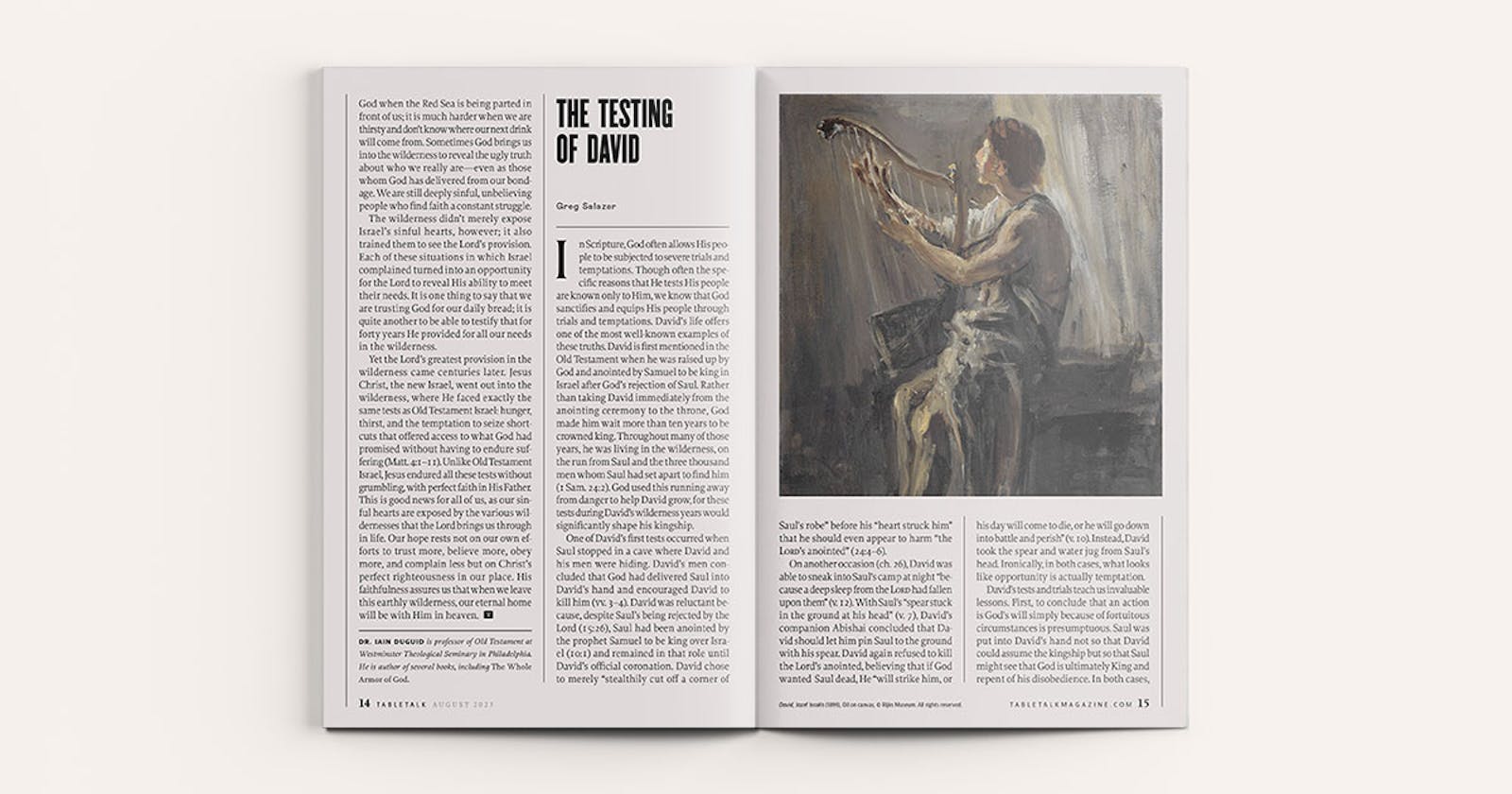
Request your free, three-month trial to Tabletalk magazine. You’ll receive the print issue monthly and gain immediate digital access to decades of archives. This trial is risk-free. No credit card required.
Try Tabletalk NowAlready receive Tabletalk magazine every month?
Verify your email address to gain unlimited access.
In Scripture, God often allows His people to be subjected to severe trials and temptations. Though often the specific reasons that He tests His people are known only to Him, we know that God sanctifies and equips His people through trials and temptations. David’s life offers one of the most well-known examples of these truths. David is first mentioned in the Old Testament when he was raised up by God and anointed by Samuel to be king in Israel after God’s rejection of Saul. Rather than taking David immediately from the anointing ceremony to the throne, God made him wait more than ten years to be crowned king. Throughout many of those years, he was living in the wilderness, on the run from Saul and the three thousand men whom Saul had set apart to find him (1 Sam. 24:2). God used this running away from danger to help David grow, for these tests during David’s wilderness years would significantly shape his kingship.
One of David’s first tests occurred when Saul stopped in a cave where David and his men were hiding. David’s men concluded that God had delivered Saul into David’s hand and encouraged David to kill him (vv. 3–4). David was reluctant because, despite Saul’s being rejected by the Lord (15:26), Saul had been anointed by the prophet Samuel to be king over Israel (10:1) and remained in that role until David’s official coronation. David chose to merely “stealthily cut off a corner of Saul’s robe” before his “heart struck him” that he should even appear to harm “the Lord’s anointed” (24:4–6).
On another occasion (ch. 26), David was able to sneak into Saul’s camp at night “because a deep sleep from the Lord had fallen upon them” (v. 12). With Saul’s “spear stuck in the ground at his head” (v. 7), David’s companion Abishai concluded that David should let him pin Saul to the ground with his spear. David again refused to kill the Lord’s anointed, believing that if God wanted Saul dead, He “will strike him, or his day will come to die, or he will go down into battle and perish” (v. 10). Instead, David took the spear and water jug from Saul’s head. Ironically, in both cases, what looks like opportunity is actually temptation.
David’s tests and trials teach us invaluable lessons. First, to conclude that an action is God’s will simply because of fortuitous circumstances is presumptuous. Saul was put into David’s hand not so that David could assume the kingship but so that Saul might see that God is ultimately King and repent of his disobedience. In both cases, David showed Saul a token (first his robe and later his spear and jug) of God’s having left Saul vulnerable to David’s attack. Yet through each of these providential tests, David’s willingness to wait on God offered Saul a further opportunity to repent. Likewise, we should be slow to draw definite conclusions about why specific providences enter our lives. Instead, with other trusted church leaders and friends, we should prayerfully consider how God would have us respond by searching the Scriptures.

Second, it is critical to wait on God’s timing rather than manipulating circumstances. Many of us know what God has commanded, and yet we are tempted to take things into our own hands. David feared God more than he desired to be king. He trusted God and waited for God to fulfill His promises. God likewise calls us to fear Him and trust Him, not only in good times, but especially in uncertainty. If God has us in the wilderness, let us not take matters into our own hands, but let us surrender to Him. God’s trustworthiness shines brightest when we trust Him rather than our own resourcefulness. He has not left us. He is with us during our trials, using them for our good.
Finally, David’s trials and temptations point to Christ. Despite David’s many failures, he was “a man after [God’s] own heart” (13:14). Yet God’s covenant with David—that his throne would “be established forever” (2 Sam. 7:16)—was fulfilled in Jesus, Israel’s true and eternal King. Jesus trusted God in the wilderness and even in death. When things looked most grim, God was working. Since Jesus is our ultimate example and hope in trials and temptations, we draw strength from looking to Him in whatever circumstances we face today.
